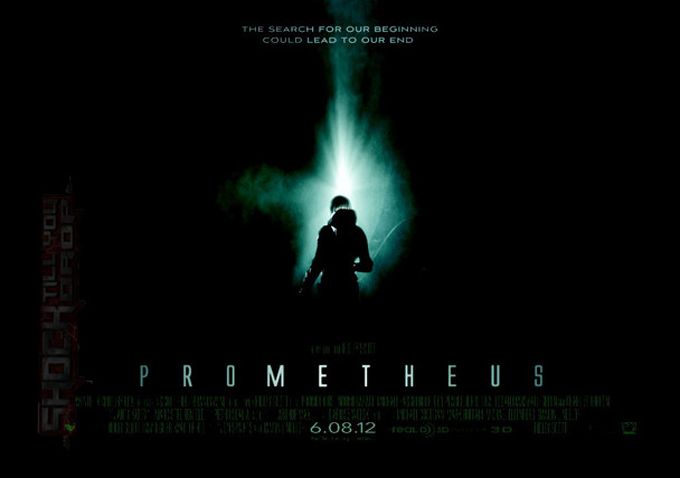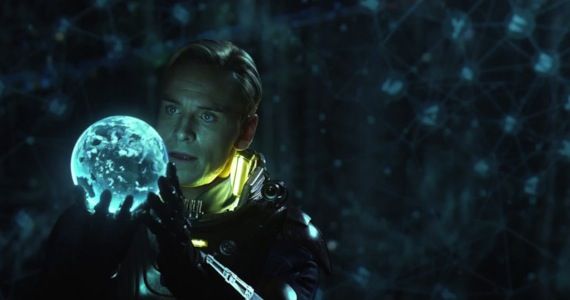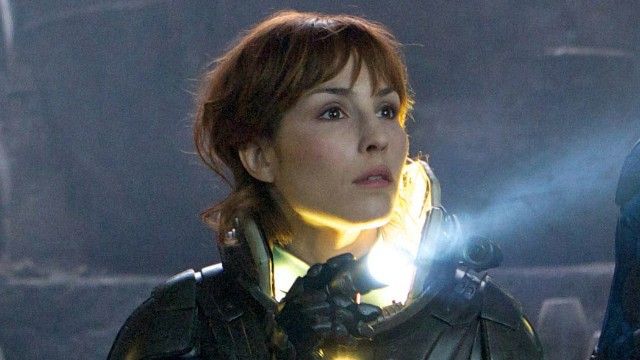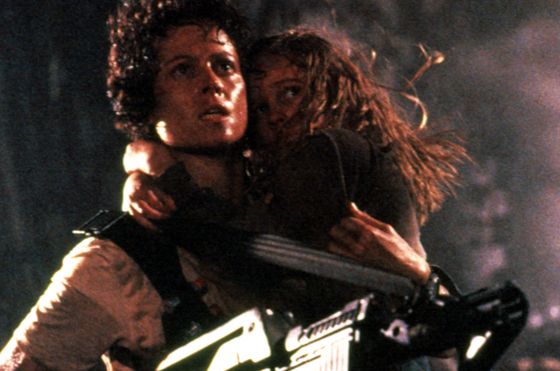I liked the first two Alien movies, and would happily watch either one again given the chance. I’m also a fan of Ridley Scott’s work in general, especially his Director’s Cuts. Noomi Rapace, Michael Fassbender, Idris Elba, and Charlize Theron are some of my favorite actors working today. And science fiction is pet genre of mine, especially when it takes itself seriously and doesn’t go straight for space opera or overdoes the camp of the pulp sci-fi of yesteryear.
So why is my heart not jumping bloodily out of my chest with enthusiasm for Prometheus?

The year is 2094. The Weyland Corporation has sponsored a pair of dedicated archaeologists, Elizabeth Shaw and Charlie Holloway, to follow the evidence they’ve found that mankind was visited by alien beings in our ancient past. The starship Prometheus was built to find these aliens and discover what, if any, connection they have to our origins. Following star maps extrapolated from cave paintings, Prometheus sets down on an inhospitable moon and almost immediately finds evidence of the archaeologists’s fabled “Engineers”. They also find something that threatens all life as we know it, to say nothing of the crew of the ship.
Prometheus begins by introducing us to some very interesting themes, especially for a science fiction film involving starships and extra-terrestrials. The ‘chariot of the gods’ concept is becoming well-tread ground, from the Stargate series to recent things like Thor and Indiana Jones and the Crystal Skull. Rather than just focusing on the aliens themselves, Prometheus sets its sights on the questions inherent with such visitations. Why did they visit us? What role did they play in our development? If they had a hand in creating us, why did they do so? From my standpoint, the focus of the narrative could have been maintained on these questions rather than pushing towards familiar Alien territory.

Despite the breathtaking visuals, haunting score, and fantastic use of 3D (even in home theater settings), Prometheus suffers first and foremost from an identity crisis. It simply can’t decide what it wants to be. A serious sci-fi film asking questions about faith, creationism, and the origins of life would be fascinating, the Alien franchise is desperate for a high-quality entry to redeem its dalliances with those wacky Predators, and Ridley Scott wouldn’t mind starting a new film series. Prometheus tries to do all of these things, admirably so, but fails in hitting the mark with any of them. The questions it wants to ask fall by the wayside when body horrors begin cropping up, the answers we do get tend to beget more questions, and characters, for the most part, behave more for the sake of advancing the plot than they do from their own motivations and personalities.
Consider David. Michael Fassbender is giving probably the strongest performance of the ensemble here, carefully channeling David Bowie into a soft-spoken android obsessed with Lawrence of Arabia. He doesn’t seem to be interested in being more human, regarding those around him with a detached curiosity rather than any longing, and it soon becomes apparent the Prometheus is something of a personal laboratory for him. However, his motives for his experimentation are tenuous at best, his methods make little logical sense, and what reasoning we do get seems to come in the form of throw-away lines and vague conversations on the relationship between creator and created. It’s cool that he has his own agenda, and he pulls of being a creepy facsimile of human life very well, but he, like much of Prometheus, is simply poorly explained.

The biggest saving grace of the film is probably Elizabeth Shaw. Noomi Rapace is not just doing a send-up of Ripley. She’s also playing one of the few characters who acts in a consistent nature, uses their head on more than one occasion, and has an interesting arc complete with tangible loss, crises of faith, and a staggering amount of determination and survival instinct. It’s very difficult not to care about her after everything we see her going through, and like us, she’s still looking for the answers to her, and our, questions.
While Prometheus suffers from some pretty major problems, it’s still the best thing to happen to the series Ridley Scott started back in 1979 since Aliens. Scott does great work behind the camera and in terms of production, the actors I mentioned are all great, and the presentation is great, at times downright stunning. The problems with the plot and character motivations can’t be overlooked, though, so while it’s hard to classify it as a strictly bad movie, it’s also difficult to give an unqualified recommendation. Being a fan of this director, these actors, and this concept and its execution, I’d probably watch it again, as the parts I enjoyed outweighed those that left me perplexed or frustrated. Just be forewarned: I don’t think Prometheus is for everybody.



